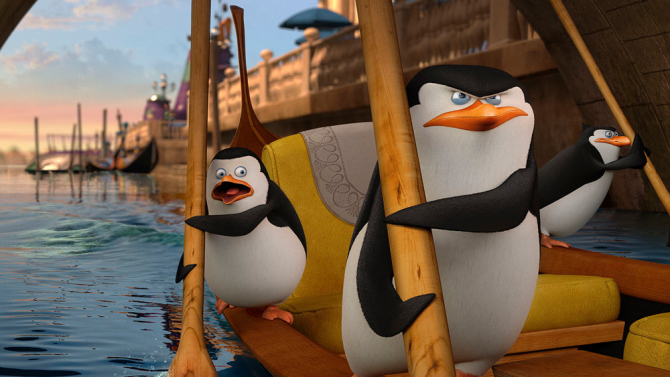

By almost any measurement — box office, stock market, public image — it’s been an annus horribilis for the DreamWorks Animation chief and the studio he built. The company’s latest big screen venture, “Penguins of Madagascar,” stumbled in its U.S. debut last week, earning $35 million over the five day Thanksgiving holiday. It had been expected to earn between $45 million to $48 million. In response, shares of DreamWorks plunged more than 9% on Monday morning.
“Movies are going to be the driving factor with their stock price and the movie business is often very hit or miss and they seem to have gotten it wrong several times now,” said Marla Backer, an analyst with Ascendiant Capital Markets.
The disappointing performance of the “Madagascar” spin-off underscores the vulnerability that DreamsWorks Animation faces as a publicly traded company that fields only two or three film releases annually. The company has tried to diversify by moving more heavily into television, new media and consumer products, but each time one of its movies opens, its stock is liable to rise or fall based on the result.
Among the company’s 2014 releases, “How to Train Your Dragon 2″ made $618.8 million, but “Mr. Peabody & Sherman” resulted in a $57 million write down. The film failures indicate that DreamWorks Animation’s approach to family fare, one that combines pop culture references, emotional uplift and a few fart jokes, may not be resonating as strongly as it once did.
At the same time, the animation market has grown more competitive, with Universal’s Illumination Entertainment and Fox’s Blue Sky Studios fielding hits such as “Despicable Me” and “Ice Age,” and Walt Disney Animation undergoing a renaissance with the likes of “Frozen” and “Big Hero 6.” Gone are the days where DreamWorks Animation and Pixar carved up the animation pie between themselves.
The need to get bigger and to guard against market fluctuations prompted Katzenberg to begin shopping around his company this year. That strategy backfired, however, when word of two potential mergers were leaked to the press, scuttling DreamWorks Animation’s potential sale to first Japanese tech giant SoftBank and later toymaker Hasbro. Each failed deal gave Katzenberg a whiff of desperation, damaging his clout on Wall Street.
Over the past year, DreamWorks Animation’s stock price has fallen steadily. It kicked off the year trading at $35.30 and opened Monday at $22.35.
It’s too early to write off “Penguins of Madagascar,” but with a production budget of $132 million plus tens of millions in promotion and advertising costs, it will lean heavily on foreign audiences in order to push it into the black. So far, the film has done respectable business abroad, earning $63 million, with several major territories left to open.
Should “Penguins of Madagascar” fail, it will become the fourth of DreamWorks Animation’s past six films to lose money. That was a fate that the studio had tried to avoid when it moved “Home,” an adaptation of the children’s book “The True Meaning of Smekday,” out of the Thanksgiving slot and into next year and replaced it with “Penguins.” The hope was that “Penguins,” with its ties to the “Madagascar” franchise, would be better able to compete during the competitive holiday.
The best thing working in “Penguins of Madagascar’s” favor is that there isn’t another major family film hitting until “Night at the Museum: Secret of the Tomb” debuts on December 17. That gives DreamWorks Animation time to establish its film as the de facto choice for parents.
“As analysts we have a tendency to overreact a bit to opening numbers, and it is true that films in the holidays can play and have longer legs,” said Backer.
The problem is that DreamWorks Animation’s strategy is to mix original films with sequels and spin-offs to its core franchises. The failure of “Penguins,” which is a spin-off to the company’s blockbuster “Madagascar” series, exposes some cracks in that plan and raises questions about how much the company is worth.
“If someone is looking to buy this company, the value Jeffrey Katzenberg is going to get just took a haircut,” said Eric Wold, an analyst with B. Riley and Company.
